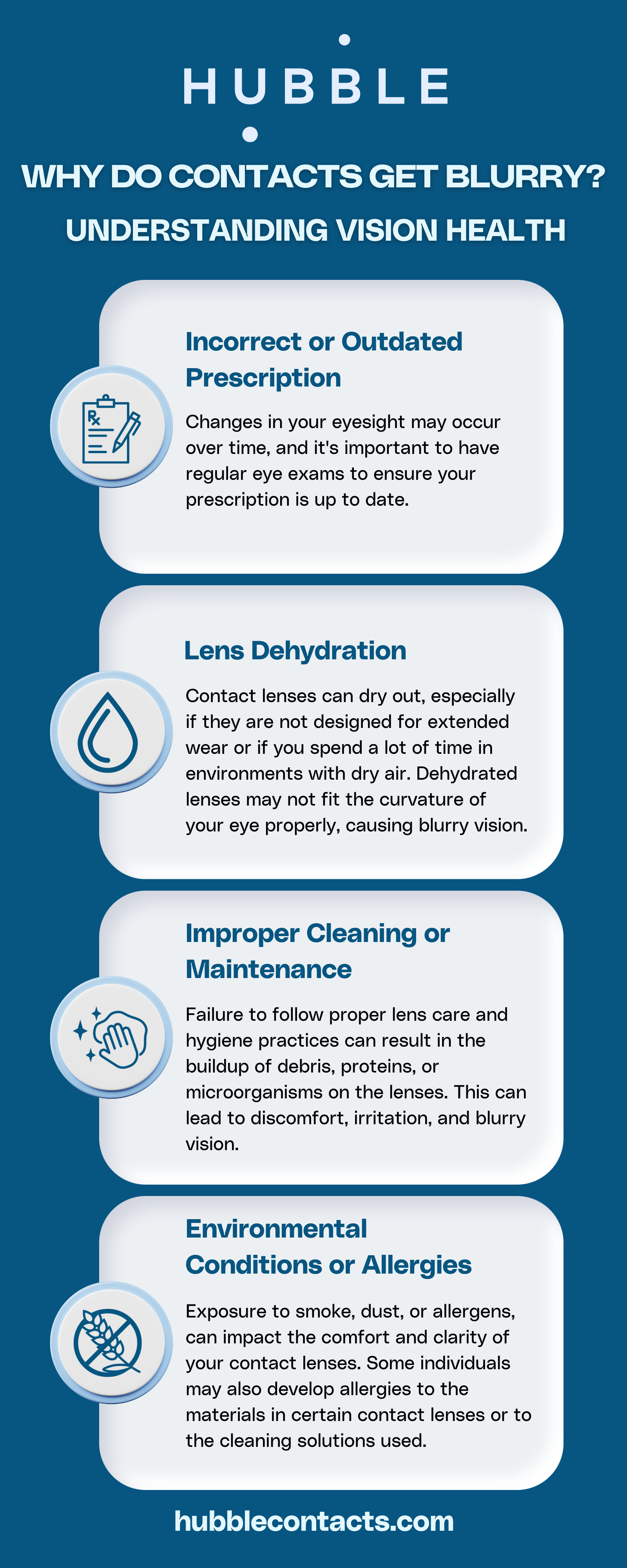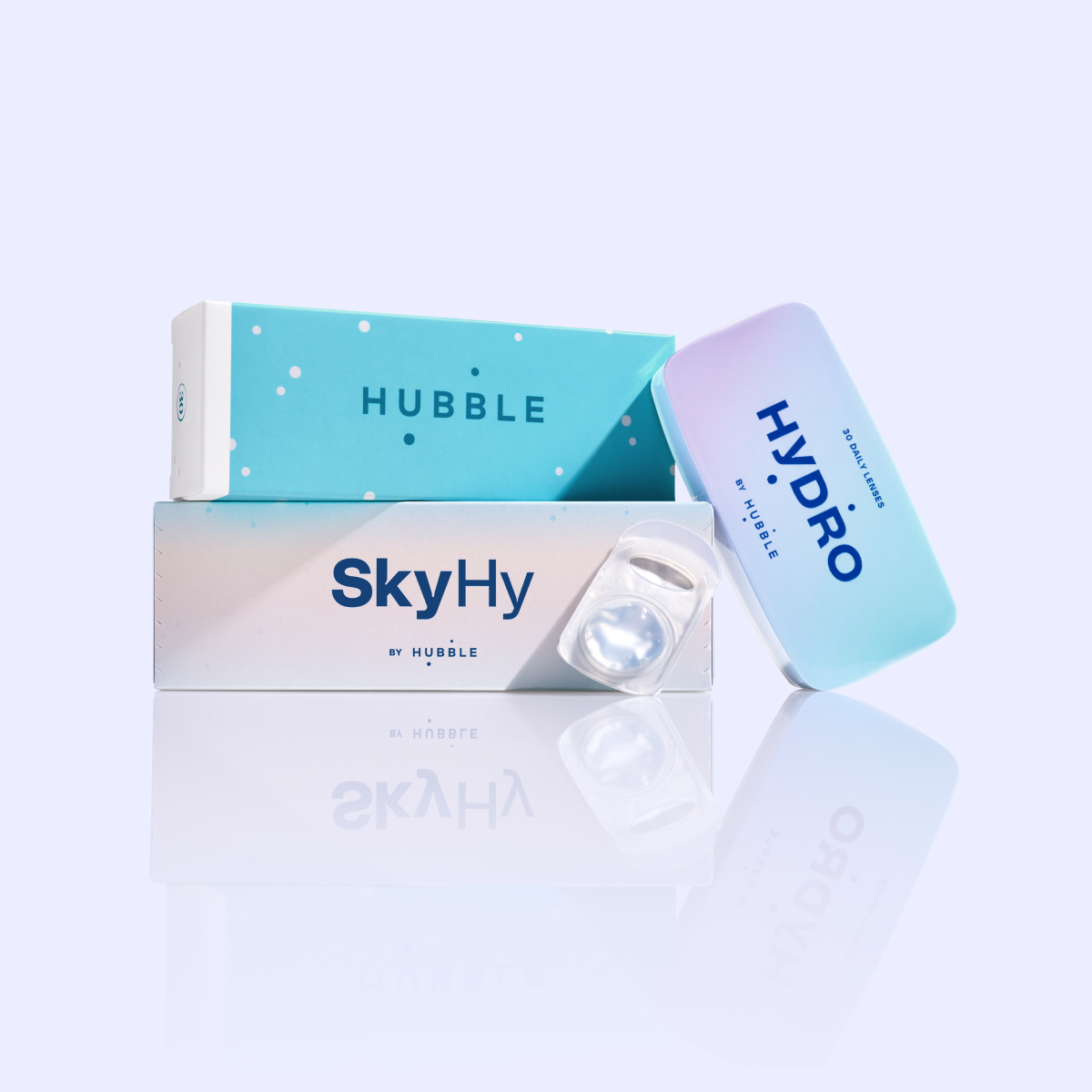Why Are My Contacts Blurry?

As you wear your prescription contact lenses over time, you may notice that it takes your eyes some time to adjust. For new wearers, the first few weeks of use might involve some blurry vision, as your eyes get used to regular lens wear.
However, long-term blurriness can also occur when wearing contacts, which is typically a sign that something isn’t exactly right. Contact lenses can become smudged, leaving your eyes to respond with blurry vision or a sense of cloudiness. If you’re wondering why your contact lens blurriness isn’t clearing up, we're exploring the most common reasons in this article, and providing tips and best practices for keeping your vision crystal clear.
Understanding Blurry Vision with Contacts: Why do Contacts Get Blurry?
Why are my contacts blurry? Contact lenses can sometimes cause blurry vision due to various reasons. Here are some common factors that may contribute to blurry vision when wearing contact lenses:
An outdated or incorrect prescription can lead to blurry vision. Changes in your eyesight may occur over time, and it's important to have regular eye exams to ensure your prescription is up to date.
Dry eyes can cause discomfort and blurry vision when wearing contact lenses. Insufficient tear production or poor tear quality can lead to inadequate lubrication, affecting the clarity of your vision.
Lens Dehydration - Contact lenses can dry out, especially if they are not designed for extended wear or if you spend a lot of time in environments with dry air. Dehydrated lenses may not fit the curvature of your eye properly, causing blurry vision.
Improper Cleaning or Maintenance - Failure to follow proper lens care and hygiene practices can result in the buildup of debris, proteins, or microorganisms on the lenses. This can lead to discomfort, irritation, and blurry vision.
Poorly fitting contact lenses can cause blurry vision. If the lenses are too tight or too loose on your eyes, they may not align properly, affecting your vision.
Environmental conditions, such as exposure to smoke, dust, or allergens, can impact the comfort and clarity of your contact lenses. These factors can cause irritation and blurry vision.
Different lens materials and designs have varying effects on oxygen permeability, moisture retention, and vision. Choosing the wrong type of contact lenses for your eyes or not following your eye care professional's recommendations can result in vision issues.
Allergic Reactions - Some individuals may develop allergies to the materials in certain contact lenses or to the cleaning solutions used. Allergic reactions can lead to redness, discomfort, and blurred vision.
Extended wear of contact lenses beyond the recommended duration can contribute to blurry vision. Over time, protein deposits on the lenses and reduced oxygen permeability can affect vision quality.
Underlying Eye Conditions - Certain eye conditions, such as astigmatism, presbyopia, or other refractive errors, may not be adequately addressed by the type of contact lenses you are wearing, leading to blurry vision.

Is It the Wrong Prescription? Understanding Lens Power
Maintaining a regular eye care routine which includes regularly scheduled eye exams, checkups, and a periodic review of your contact lens prescription is vital to your eye health. An often simple reason that your contact lenses appear blurry is that you may have the wrong prescription.
Power (PWR) refers to the strength of the lens prescription and is represented with a number. This component can also be represented by the acronym (SPH) or spherical correction. This refraction power is the unit of measurement used for this component. Having an updated power measurement is important as the numbers help provide correction to get as close to a 20/20 vision as possible.
Lens Care and Maintenance: Avoiding Damage and Buildup
Eye care and contact lens hygiene practices are the keys to avoiding blurry contact lenses. Keeping contact lenses clear from bacteria or protein build up, which if neglected, can cause eye infections. When you wear contact lenses honoring the contact lens case replacement schedule, every three months as recommended, becomes important for avoiding damage to your delicate contacts.
More effectively, wearing daily disposable lenses is a great way to keep your eyes build-up and debris free to provide the clearest unrestricted vision and comfort.
Eye Conditions and Contact Lens Complications
Eye conditions that are related to contact lenses and allergies arise from attracting pollen and other particles from the air, making contact lens wear uncomfortable. Contact lenses are made to be permeable and soft, offering an easy target for dust and pollen to attach to.
Wearing dailies, meaning a specific type of contact lens meant for one day of use, ensures you are using new contacts each time. Dailies help reduce the likelihood of developing deposits and other allergens on the lens itself.
Dry Eye Syndrome is characterized by a lack of sufficient lubrication and moisture on the surface of the eye. This can lead to discomfort, irritation, and a range of symptoms that affect the eyes.
Common symptoms of Dry Eye Syndrome include:
- Dryness - A sensation of dryness or grittiness in the eyes.
- Burning or Stinging - The eyes may feel a burning or stinging sensation.
- Redness - Dry eyes can result in redness due to irritation.
- Blurry Vision - Vision may become temporarily blurred, especially during activities that require prolonged concentration, such as reading or using a computer.
- Sensitivity to Light - Increased sensitivity to light (photophobia) may occur.
- Watery Eyes - Paradoxically, some people with dry eyes may experience excessive tearing as the eyes try to compensate for the lack of sufficient moisture.
Choosing the Right Contact Lenses for Clear Vision
Selecting the right contact lenses for overall clearer vision begins with an eye examination with an optometrist or ophthalmologist. These eye care professionals will assess your eye health, prescription, and specific needs.
Obtaining an updated prescription for contact lenses can help enhance clarity and blur-free vision. Your prescription will include details such as the power (diopters), base curve, diameter, and possibly the brand.
Choosing your contacts based on different contact lens materials that offer varying levels of oxygen permeability and moisture retention is another consideration. SkyHy by Hubble contact lenses are made with doctor-recommended silicone hydrogel material for enhanced oxygen permeability.
Using contact lenses that have a higher water content provides more comfort for individuals and thus less blurriness. Your eye care professional can guide you on the optimal moisture content. Lenses with higher water content can be more comfortable for dry eyes, as they are better at retaining moisture.
Daily Contact Lenses: A Clearer Choice
Wearing daily contact lenses is one way to ensure a fresh pair of contact lenses each time for maintaining clear vision. Dailies are contact lenses that are changed every day, which can help reduce issues like irritation or blurriness. Given that dailies are only meant to be worn for one day, this helps enhance comfort and lower the chances of dry eyes, irritated eyes, and build-up of protein deposits on the contacts.
You can experience the safest and most comfortable way to wear contact lenses with Hubble’s range of contacts, all of which are dailies and all of which arrive right at your door with our personalized subscription offering. For a soothing and naturally moisturizing solution, consider Hydro by Hubble, which offers reduced friction and heightened comfort with its ultra-slim edges, all while being encased in the planet's most compact eco-conscious packaging.

Prescription Contact Lenses Online: Convenience Meets Quality
Hubble provides ease of use with your prescription information sourced directly from your doctor’s prescription to ensure an accurate fit, prescription strength, and that your contact lenses reflect the most up-to-date information. Hubble’s prescription contact lenses are FDA-approved ensuring the safety of these medical devices used to improve clarity of vision.
To get the most out of ordering prescription contact lenses online, order the safest, simplest, most comfortable fit starting with Hubble. All of our lenses are FDA-approved and designed for easy insertion, all-day comfort, and crystal-clear vision.
Practical Tips for Maintaining Clear Vision with Contacts
There are practices you can follow to maintain optimal clarity of vision with your lenses, starting with cleaning your contact lenses regularly. Cleaning your contacts with contact lens solution is an important part of maintaining and protecting your eyes’ health.
Here are some more practical tips to ensure great uninterrupted vision:
- Begin with clean and dry hands before placing or removing your contact lenses.
Clean your monthly or biweekly contact lenses with each use using a fresh dose of contact lens solution every time. - Clean your contact lens case to help defeat allergens, dust, or particles, which in turn provides consistent comfort and overall focus and vision.
- Never shower with your contact lenses in.
- Do not sleep with your contact lenses, unless they are explicitly intended for overnight use.
- Keep your contact lenses in the contact case when not in use (if using monthly wear or extended wear contact lenses).
- Consider using a lubricating eye drop to help reduce dryness and discomfort. Additionally, use a contact lens solution specifically designed for comfort.
- Remove the contact lenses and rinse them with the eye solution if you experience any eye irritation. Do not rub your eyes as that might cause infection if there happens to be any debris on the lens.
- Ensure you always use a contact lens solution that is made for contact lenses and do not improvise using water.
- Keep your contact lenses cleaned and then see your doctor if the blurry vision with contacts continues as this may demonstrate signs of infection that only a qualified medical professional can address.
When to Consult an Eye Care Professional
When you are having persistent or chronic eye blurriness, dryness, or if you experience changes in your vision it is time to seek a medical eye professional to address these issues. Progressive eye pain, redness, runny eyes, and discomfort can be indicative of a serious eye condition like conjunctivitis (pink eye) or another eye infection.
Discontinue contact lens use and then seek help from your eye doctor or other medical professional. Keeping a current eye care health routine that includes regular eye exams will increase the likelihood that your contact lenses are consistent with a proper fit and are comfortable to wear.
Experience the Clarity with Hubble Contacts
With routine practice that includes consistent care of your contact lenses and regular monitoring of your eye health and vision, you can decrease any persistent blurry vision or discomfort and be on your way to good vision with Hubble. Choose from a diverse range of daily wear contact lens options and get them delivered where and when you need them. Our disposable contact lenses are designed for all-day comfort with a trim, thin edge, making them extra easy to pop in and out, and our extensive collection ensures you'll find the perfect lenses to suit your visual requirements.
The subscription process that Hubble curates ensures your contact lenses arrive on time with recurring orders so you never run low. Plus, receive a first-order discount on any Hubble Contacts Subscription, including our Classic by Hubble contacts which are always just $1 for your first order!
To get the most out of your contact lenses today—and save some time on contact lens care—start your subscription with Hubble Contacts.



